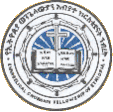| P'ent'ay (ጴንጤ) Wenigēlawī (ወንጌላዊ) | |
|---|---|
 | |
| Type | Eastern Christianity |
| Classification | Eastern Protestant Christian |
| Orientation | Pentecostal, Lutheran, Baptist, Mennonite, Anglican, Adventist, Holiness, Methodist, Presbyterian |
| Polity | Congregationalist and Presbyterian |
| Region | Ethiopia, Eritrea, United States, Canada, Norway, Sweden, Finland, Denmark, Germany, United Kingdom, Israel, Kenya, Australia, and other parts of the Ethiopian–Eritrean diaspora |
| Language | Oromo, Amharic, Sidama, Tigrinya, and Ethiopian-Eritrean diaspora vernacular languages |
| Founder | Peter Heyling |
| Origin | 19th–20th centuries |
| Members | ~16,500,000 |
| Other name(s) | Ethiopian Evangelical Church, Eritrean Evangelical Church, Ethiopian Evangelicalism, Eritrean Evangelicalism |
| Official website | Official ECFE website (english) |
| Part of a series on |
| Christianity |
|---|
 |
P'ent'ay (from Ge'ez: ጴንጤ P̣enṭe) is an originally Amharic–Tigrinya language term for Pentecostal Christians. Today, the term refers to all Evangelical Protestant denominations and organisations in Ethiopian and Eritrean societies. Alternative terms include Ethiopian–Eritrean Evangelicalism or the Ethiopian–Eritrean Evangelical Church.[1][2][3][4] Sometimes the denominations and organizations are known as Wenigēlawī (from Ge'ez: ወንጌላዊ wängelawi "evangelical").
Evangelical Christianity was originally introduced by American and European Protestant missionary work, which began in the 19th century among various peoples, including Christians schismed from the Orthodox Tewahedo church,[5] other branches of Christianity, or converted from non-Christian religions or traditional faith practices. Since the creation of P'ent'ay churches and organisations, prominent movements among them have been Pentecostalism, the Baptist tradition, Lutheranism, Methodism, Presbyterianism, the Mennonites,[6] and the Eastern-oriented Protestant Christians within Ethiopia and Eritrea and the Ethiopian and Eritrean diaspora.[7][5][8]
- ^ "Antsokia Ethiopian Evangelical Church". www.antsokia.net. Retrieved 21 September 2020.
- ^ "About the Evangelical Theological College". Evangelical Theological College. Retrieved 21 September 2020.
- ^ "International Ethiopian Evangelical Church". International Ethiopian Evangelical Church. Retrieved 21 September 2020.
- ^ "Evangelical Church Fellowship of Ethiopia". www.ecfethiopia.org. Retrieved 21 September 2020.
- ^ a b "Ethiopian Culture – Religion". Cultural Atlas. Retrieved 2 December 2020.
- ^ "Current Influences and connections of western and Ethiopian churches" (PDF). worldmap.org. Retrieved 22 March 2016.
- ^ "The peace-making Pentecostal". www.eternitynews.com.au. 15 October 2019. Retrieved 21 September 2020.
- ^ Bryan, Jack. "Ethiopia Grants Autonomy to Evangelical Heartland". News & Reporting. Retrieved 2 December 2020.